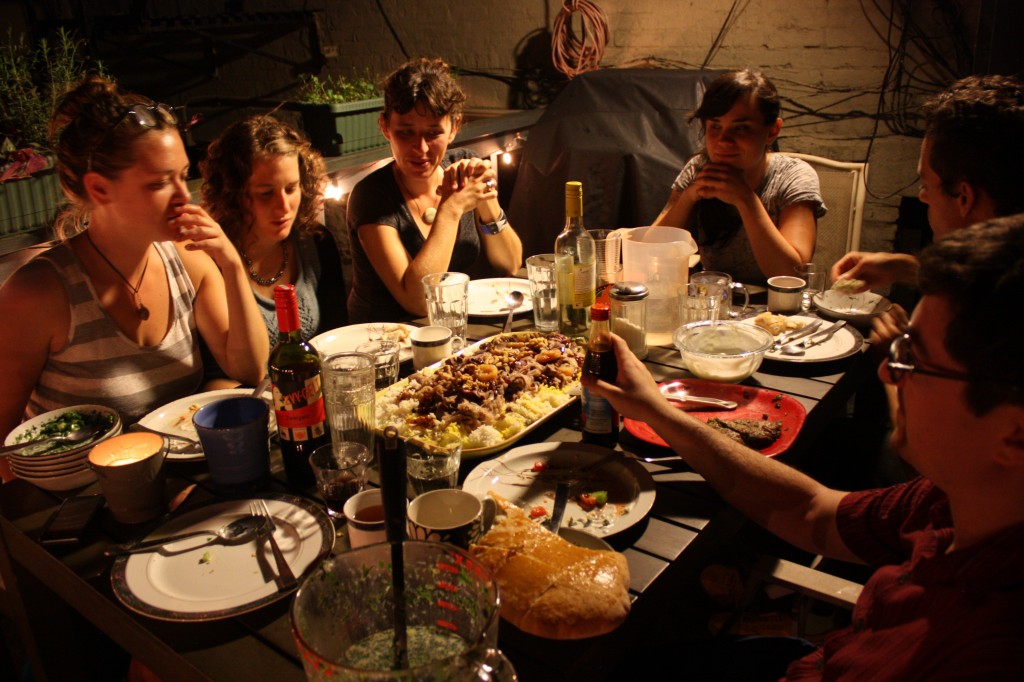Week 11: Azerbaijan
"Do you have narsharab?" I asked the older gentleman, whose dusty and rambling Middle Eastern grocery shop seems to wither a bit in the shadow of the much busier, more popular, and crowded neighbor across Atlantic Avenue, Sahadi's. "Where are you from?" he responded. "That's not the English name for what you're looking for. Do you speak Persian?"
I'd been emailing with Marsha, our Azeri guest for tonight's meal, who said that narsharab was a must. But somehow I didn't make the connection that that's the same thing as pomegranate molasses, which is kind of like the maple syrup of the Near East: pomegranate juice boiled down to the consistency of, well, molasses. And then it all clicked for me linguistically.
"Nar" means pomegranate in Turkish and, apparently, Azeri. "Sharab," well, I figured it out. I'd read that "sharbet," which has been kind of bastardized in English and other European languages to be a frozen fruit-based dessert, is actually a chilled fruit drink: pour boiling water over something, let it steep for a few hours, strain it, add sugar, chill, drink. I also remembered that "şarap" (the s-with-a-hook is pronounced sh) is the Turkish word for wine. Noticing a similarity? Perhaps even the English word "syrup?" Turns out they all come back to the Arabic word meaning drink, such as "shariba," meaning he drank. Well then! Narsharab: liquid pomegranate.
Appropriately for this discovery, this meal was all about liquids and syrups in various forms. It was also fun and delicious. Our guests were Marsha the Azeri, Julia, Tammy, Robin, and Drew. It was a simply lovely and unseasonably warm and dry evening, so we enjoyed what's likely our last outdoor meal for a good while.
Tea
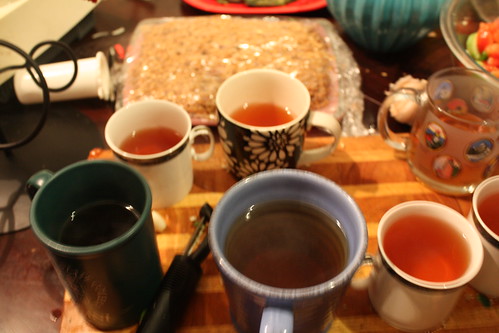
Black tea is considered the national drink of Azerbaijan. We still have plenty of Turkish tea from our trip this summer, and it did the trick just fine. A little dangerous to drink caffeine at night, but what the heck.
Goyerti Küküsü | Fresh herb frittata | Recipe

So lovely and simple: a bunch each of cilantro, dill, and scallions, mixed with eggs and pan-cooked in a generous amount of butter. I dread stovetop scrambled egg dishes that aren't scrambled, because the flipping part is usually terrible. But this recipe practically acknowledges that you're going to slice it to serve anyway, so why not slice it in the pan and flip the wedges? Brilliant. Still a bit tricky but nowhere near as fraught. Served with garlicky yogurt, this went just great with tea.
Ovdukh | Cold yogurt and herb soup | Recipe
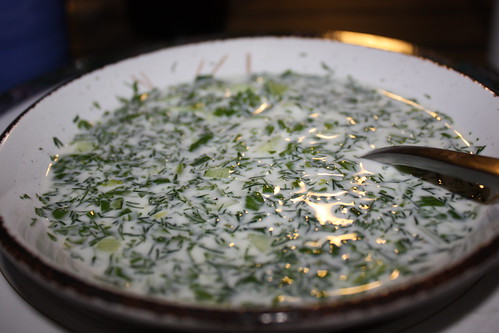
Forget gazpacho. You want a refreshing cold soup? Ovdukh has you covered. It's kind of like the kükü above where you start with chopping a bunch of herbs, except this time you add cucumber and garlic and pour yogurt on it. Actually, I used unsweetened kefir instead of diluted yogurt, which gives similar effect in the end. Turned out pretty similar to dough from Afghanistan (remember, pronounce "dough" like a Klingon), yet it was a lot more approachable when slurped from a spoon rather than a glass. Note also that we skipped the boiled egg and ground beef; Marsha tells us this is considered a Russian variation.
Shepherd salad
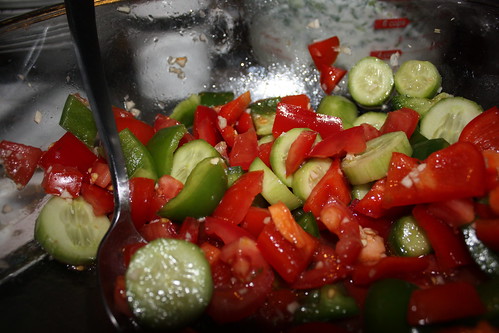
A nice little assortment of tomatoes, cucumbers, and peppers, with lemon, garlic, and olive oil, to round out the appetizer, all chopped up by Drew.
Tendir choreyi | Tandoori bread | Recipe
I never saw any mention of Azerbaijani sandwiches in my research, which is kind of a shock. This bread is, like, perfect for sandwiches. A good thick and lightly flaky crust thanks to the egg yolk wash, and a nice sponge in the middle. (The organic King Arthur bread flour probably made a difference!) Well, anyway, we just took it and ripped it up. (No photo but the one on the recipe is right on!)
Parcha doshamya plov | Pilaf of lamb, dried fruits and walnuts | Recipes: stew, rice
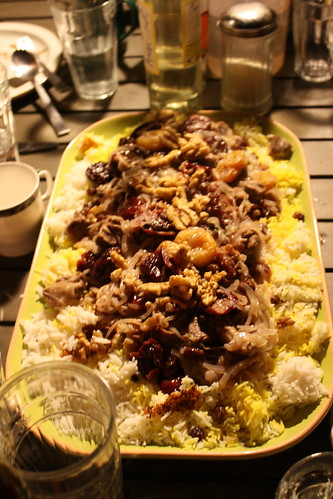
A plov (pilaf) is the pièce de résistance of any food event of any importance in Azerbaijan. In this case, the resistance came from the sheer quantity: for some bonehead reason I decided to double the recipe, and had to pull out bigger pots to account for it all. Be that as it may, it turned out very well. Marsha helped me present it all pretty-like, with yellow-and-white rice spread on the platter, and mounts of onion, fruit (including the sour plum called for — thank you Sahadi's!), nuts, and lamb on top. The big revelation, though, came with that narsharab I mentioned at the beginning of the post: we used it like ketchup as a flavor enhancer, and ooh-wee, it's a great, intense, sweet-sour hit. If you follow this recipe, you can safely cut all the dried fruit in half as far as I can tell.
Samani halva | Malted wheat halva | Recipe A, Recipe B
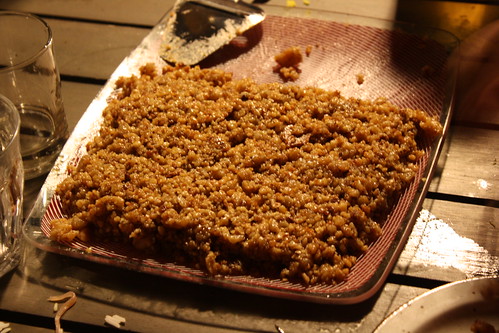
Sheesh, this one was tough. I started two days prior by steeping the wheat berries and getting them sprouting. They did sprout, but that's where the trouble began. The recipe said to squeeze out the "nutritious liquid," but I got barely anything. Then I found another recipe that called to put it through a mincer, so I put my Cuisinart to work, and that got out a little but not much more. So I ended running some water through the wheat which did seem to extract some milky, malty liquid. Anyway, I cooked the dough and tediously stirred it all afternoon, poured in the grape syrup (see!) and walnuts, and then added the strange and wonderful combination of spices: cinnamon, nutmeg, fennel, and...pepper. Yes, pepper in a dessert! (By the way, the first recipe calls for 100 grams of nutmeg. That is insane and clearly a typo, please use your common sense if for some reason you're compelled to make this dish.) I completely failed in making balls or rounds out of it so I just smushed it all together on a plate. It was yummy enough, but in my view it was too much work for the reward.
Nanəli şərbət | Mint sharbat | Recipe
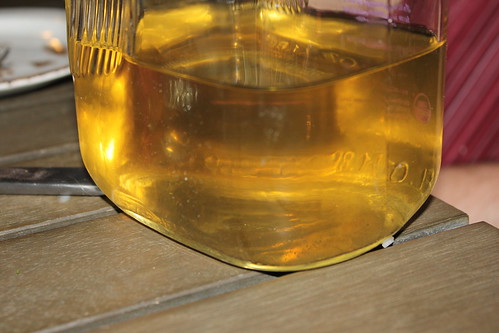
On the other end of the effort/reward ratio, I present this lovely drink. (And no, it's not pee.) So simple, and just delicious. Steep the mint for a few hours, strain, add sugar (thank you Robin for making it "Honest Tea" sweet), enjoy. It went shockingly well with the halva — so maybe all that effort was worth it to allow the sharbat to reveal such a moment of crisp clarity after the spiced frenzy. (Hey linguistics dorks: notice how they use a schwa in their written language!)
Nar | Pomegranate
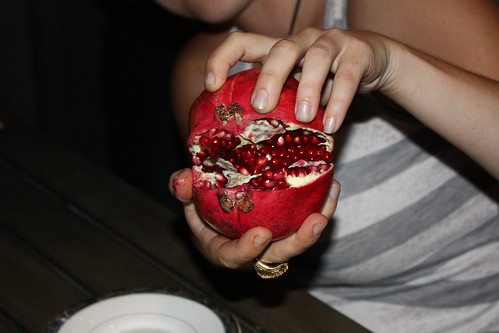
We took the word "syrup" from the Middle East, but for some reason we had to come up with a four-syllable, hard-to-spell name for a fruit that has a perfectly short and useful name ripe for the borrowing. Anyway, Marsha led us through a post-dinner nar appreciation session deftly separating it and passing out segments, which we all plucked out and crunched and savored.
This meal actually took a lot of work to research, since it seems that most of what I can find on the internet is all copies of other recipes and Wikipedia articles. It's a shame, I'm sure there's a lot of diversity and variety in the cuisine that just hasn't made it online yet. But I'm sure glad that at least this much was up there.
And that is it for the A countries! We're on to the Bahamas next.
